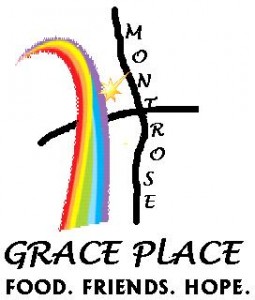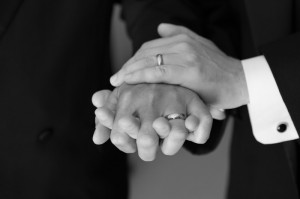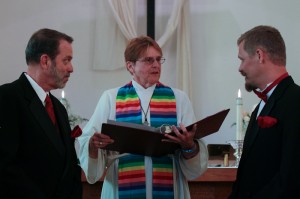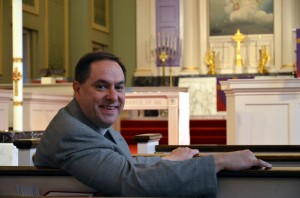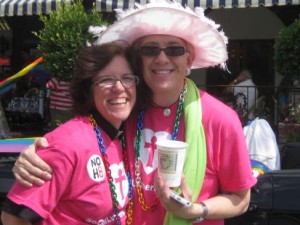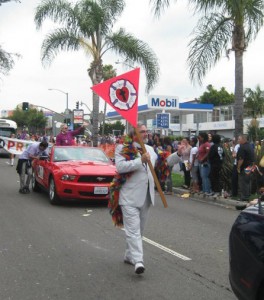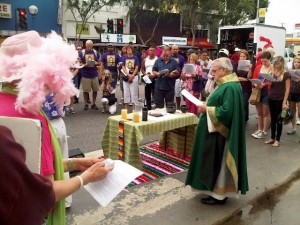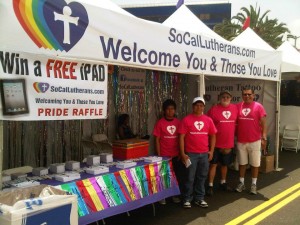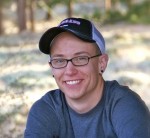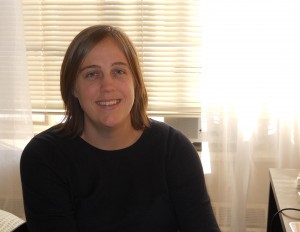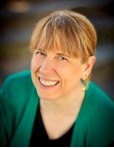 Today we hear from guest blogger, the Rev. Susan M. Strouse, pastor of First United Lutheran Church in San Francisco, CA. After calling openly gay pastor Jeff Johnson, First United was suspended in 1990, then expelled in 1995. Their actions, along with those of St. Francis Lutheran Church began the movement that became Lutheran Lesbian & Gay Ministries, then the Extraordinary Candidacy Project and eventually to the formation of Extraordinary Lutheran Ministries. First United has remained an active independent Lutheran congregation. On July 15, they will vote on whether or not to become a congregation of the Evangelical Lutheran Church in American. In this guest blog (reposted with permission from PS – Pastor Susan’s Blog), Pastor Susan shares part of that journey. You can follow the rest of this story on Pastor Susan’s blog by clicking here.
Today we hear from guest blogger, the Rev. Susan M. Strouse, pastor of First United Lutheran Church in San Francisco, CA. After calling openly gay pastor Jeff Johnson, First United was suspended in 1990, then expelled in 1995. Their actions, along with those of St. Francis Lutheran Church began the movement that became Lutheran Lesbian & Gay Ministries, then the Extraordinary Candidacy Project and eventually to the formation of Extraordinary Lutheran Ministries. First United has remained an active independent Lutheran congregation. On July 15, they will vote on whether or not to become a congregation of the Evangelical Lutheran Church in American. In this guest blog (reposted with permission from PS – Pastor Susan’s Blog), Pastor Susan shares part of that journey. You can follow the rest of this story on Pastor Susan’s blog by clicking here.
Circling Back towards the ELCA
When I moved to Berkeley in 2002, my bishop back in the Upstate New York synod cleaned out my file and sent me a few documents she thought I’d like to have. One of them was a copy of the letter I had written in 1995 to the synod council of the ELCA, begging them not to expel the two churches in San Francisco for calling openly gay pastors. I love it that a copy of that letter made it back into my file.
Little did I know then that nine years later I myself would be called to one of those congregations, First United. It was and is a great fit, and I feel privileged to be part of this amazing group of people. Now, the wheel of history has turned once again, and First United is poised for a historic vote next month to decide whether or not to return to the ELCA.
The road to July 15 has not been without its bumps – even when they called an openly straight pastor! Before the ELCA changed its ordination policy, there was little discussion about returning. The only reason then would have been to insure that I would not be dropped from the clergy roster, having been placed ‘on leave from call’ when I went to First United. I didn’t want that to be the reason, and I’m grateful to Bishop Mark Holmerud for finally making that a non-issue.
And then the policy changed. Everyone immediately wanted to know if we’d be coming back. St. Francis began their process towards reinstatement. Opinion in the community was divided. Some asked, “Well, why wouldn’t you?” Others, “Why would you?” Within the congregation there didn’t seem to be much incentive to make a change.
But with the reception of the ELM 7 – http://extraordinarylutheranministries.blogspot.com/2010/06/eucharist-and-rite-of-reception-and.html
and then St. Francis’ beautiful ‘Festival of Reconciliation and Restoration’ – (http://www.elca.org/Who-We-Are/Our-Three Expressions/Churchwide-Organization/Communication-Services/News/Releases.aspx?a=4719)
the spotlight was on us. We entered into a time of discernment, including a congregational forum facilitated by the Rev. Dr. Rachel Rivers, a Swedenborgian minister and licensed counselor and spiritual director. We made a list on three separate sheets of newsprint: ‘What Would We Gain By Rejoining the ELCA,’ ‘What Would We Lose . . .’ and ‘What Do We Have to Offer the ELCA?’
The discussion revealed some fear: of loss of identity, of uniqueness, of forgetting our history. It also revealed awareness: of the need to forgive, of the danger of moral superiority, of the courage of the ELCA to change the policy. And possibilities: of what gifts we could bring to the denomination, of being part of working for change from within the system, of being part of something bigger than ourselves. It was a fabulous forum, and we appeared to be well on our way to a decision.
Then we ran up against the constitution. The next step of the process was to get our constitution in alignment with the ELCA model. Sounds simple, right? Not for First United! With a strong commitment to inclusive language, insistence on an article about the right to marry, and a penchant for getting bogged down in wordsmithing everything anyway – the constitution became a stumbling block. It took us a year to work through feelings of attachment to the constitution that had been written after the expulsion and anger at once again having to submit to an institution’s authority. We finally worked through it all and sent it off to the synod, an it was approved last month. And now we get to vote.
Last week at our annual meeting, the proposed constitution was introduced with a tongue-in-cheek “In 1996, when the ELCA left us . . .”), followed by Q&A time. It was an honest – at times emotional – productive discussion. And now we are ready. On July 15, we’ll vote
1) to rescind our current constitution;
2) to accept the proposed new constitution;
3) to rejoin the ELCA
As we circle back, we do so knowing that we have all been changed by the past 20+ years: Jeff Johnson, Ruth Frost and Phyllis Zillhart, the pastors called to First United and St. Francis, the two congregations, the ELCA, countless people interested in and affected by the story. My story is a small part of it, but I feel incredibly privileged to be part of it at all. My circle – from pastor of North Park Lutheran Church in Buffalo in 1995 to pastor of First United in 2012 – is part of the bigger circle, which is part of a bigger circle, which is part of . . . and so on.
Stay tuned for news on July 15.
